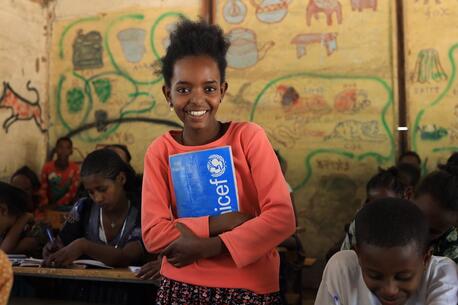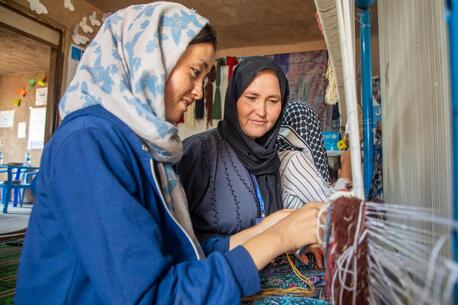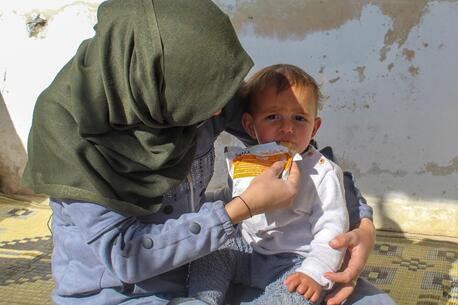#MeToo Sparks a Global Conversation on Violence Against Girls & Women
UNICEF supports the right of all girls and women to live a life free of sexual harassment and assault.
UPDATE: A troubling new UNICEF report and a #HerToo social media movement highlight the need to speak out against violence and sexual abuse on behalf of those suffering in silence.
"If you've been sexually harassed or assaulted write 'me too' as a reply to this tweet," actress Alyssa Milano tweeted on Sunday afternoon, October 15. Within days, the hashtag #MeToo had been used 1.25 million times. Social media feeds filled with stories of workplace harassment, childhood molestation and rape.
Milano, a UNICEF Ambassador since 2003, had clearly touched a nerve.
If you’ve been sexually harassed or assaulted write ‘me too’ as a reply to this tweet. pic.twitter.com/k2oeCiUf9n
— Alyssa Milano (@Alyssa_Milano) October 15, 2017
UNICEF Ambassador Alyssa Milano's tweet encouraging women to share their experiences of sexual abuse helped promote a growing discussion examining widespread violence against women.
Recent reports in The New York Timesand The New Yorker exposing decades of predatory sexual behavior by movie mogul Harvey Weinstein sparked this latest discussion on widespread violence against women. But the conversation is hardly a new one. Activist Tarana Burke used "Me Too" in the grassroots campaign she launched 10 years ago to help bring the issue to light and let victims of sexual assault know that they were not alone. A frank discussion of gender-based violence is vital to the health and well-being of girls and women around the world — and to society as a whole.
UNICEF is very much in favor of this conversation: As feminist activist Gloria Steinem put it, "The greatest indicator of the world's stability, wealth and safety is the status of women." All girls and women deserve to be treated with respect, to choose and shape their own future free of intimidation and violence. Violence against women needs to be discussed openly, not hidden.
The shame belongs not to the abused, but to the communities that allow assaults on girls and women to go unchallenged
- Around 120 million girls, more than 1 in 10, are estimated to have experienced rape or other forced sexual acts
- Every ten minutes, somewhere in the world, an adolescent girl dies as a result of violence
- Violence is the second leading cause of death among adolescent girls globally
- One in four girls gets married as a child
- 63 million girls have undergone female genital mutilation
- 130 million girls are out of school
- Girls are twice as likely to be infected with HIV
UNICEF is fighting to end violence against girls and women
When girls do better, we all do better. UNICEF is focused on helping girls thrive by:
- Ensuring equal access to education — Strong, well-educated girls grow up to transform their communities and then pass on those benefits to their children. 61 million girls are out of school at the primary and lower-secondary level. Twice as many girls as boys will never even start school
- Preventing child marriage — 15 million girls are still married every year
- Ending human trafficking — women and girls are the most frequently identified victims of trafficking
- Improving water infrastructure — in the developing world, girls spend an average 200 hours each year fetching water for their families, forcing them to miss out on school
- Providing quality health care — 300,000 girls and women die each year from complications in pregnancy and childbirth
- Promoting programs designed to end gender-based violence and offering psychosocial support to girls and women who have been harmed
- Stopping female genital mutilation (FGM) — this year alone, millions of girls will be forced to undergo FGM, most of them before their fifth birthday

UNICEF Ambassador Alyssa Milano in Kosovo in 2010. © UNICEF/UN040794/Llapashtica
Banner photo, top: Cynthia, 21, a migrant from Delta State, Nigeria at a safe house on the outskirts of Taormina, Sicily, Italy on April 27, 2017. Cynthia was smuggled into Europe by sex traffickers, who first promised her work at a pharmacy, but then forced her into prostitution. © UNICEF/UN063817/Gilbertson VII Photo
HOW TO HELP
There are many ways to make a difference
War, famine, poverty, natural disasters — threats to the world's children keep coming. But UNICEF won't stop working to keep children healthy and safe.
UNICEF works in over 190 countries and territories — more places than any other children's organization. UNICEF has the world's largest humanitarian warehouse and, when disaster strikes, can get supplies almost anywhere within 72 hours. Constantly innovating, always advocating for a better world for children, UNICEF works to ensure that every child can grow up healthy, educated, protected and respected.
Would you like to help give all children the opportunity to reach their full potential? There are many ways to get involved.



Donation FAQ
DonateUNICEF works in over 190 countries and territories to save children’s lives and defend their rights. UNICEF has helped save more children’s lives than any other humanitarian organization.
However, UNICEF wants more for children than survival. Before, during and long after disaster strikes, UNICEF and partners provide programs designed to help every child fulfill their potential, from early childhood through adolescence.
Yes, all donations made to UNICEF USA are 100 percent tax-deductible. You will receive a receipt for tax purposes for your records. For reference UNICEF USA’s tax ID information is:
U.S. Fund for UNICEF d/b/a UNICEF USA
Our Federal Identification Number is 13-1760110.
The IRS letter confirming our 501(c)(3) status can be downloaded here in PDF format.
UNICEF employs rigorous monitoring and evaluation processes to assess the impact of its programs. Through data collection, assessments and engagement with the communities it serves, UNICEF ensures that interventions achieve the maximum outcomes for the most significant number of children.
You can always find more information on how to support UNICEF USA here: https://www.unicefusa.org/how-help/donate


